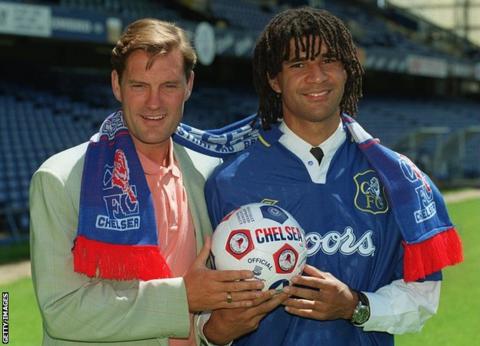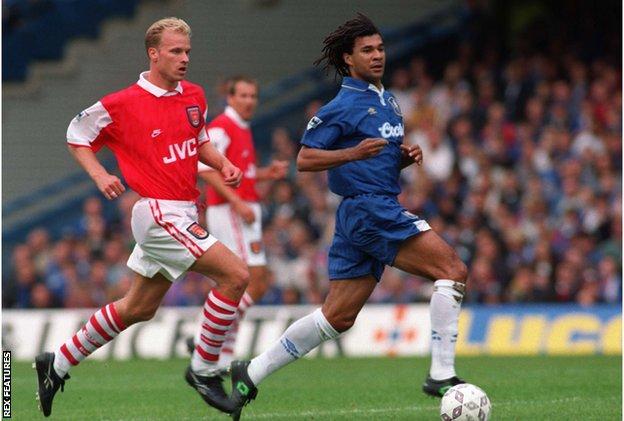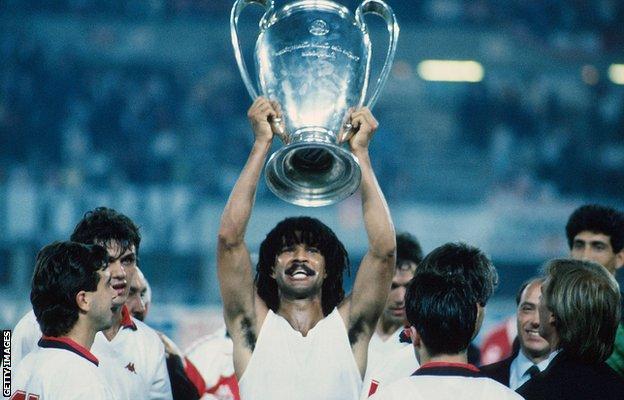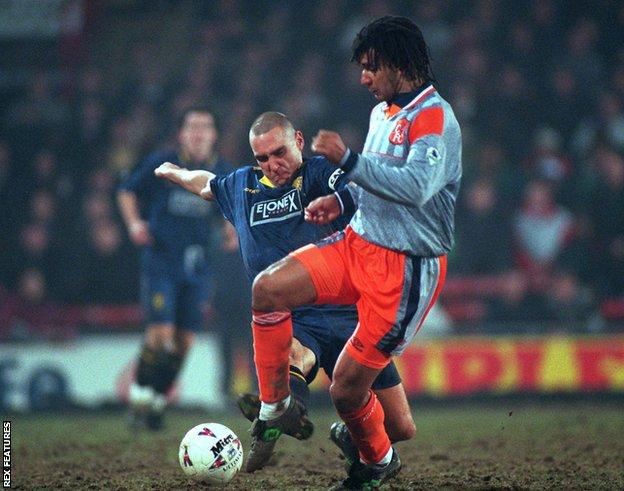Chelsea was My Paradise But- Ruud Gullit

I'm still sad about the way it ended, but my
time at Chelsea will always be my happy time. It was paradise for me.
It makes me feel very old that it's 25 years
since I moved to England, but sometimes it still seems like yesterday. I fell
in love with London straight away because I found a kind of freedom that is
priceless. It was my happy place and the Chelsea players were my 'lovely boys'
- let me try to explain why.
When I joined Chelsea, in June 1995, the
Premier League was very different to the way it is now. I wasn't the first
overseas player to come here, but I was one of the first to arrive with a big
name, from a bigger league, such as Serie A.
Looking back, that summer was probably the
time the Premier League really began to change into the competition it is now,
and it had to. Italy was the king then - all the best players were there.
English football was very basic in comparison, and the English wanted to have
people from outside so they could try to get their game back again to the
highest European level.
Dennis Bergkamp, David Ginola, Juninho. They
all came at the same time as me. The way I saw it, it was an adventure.
Personally and professionally, I needed to leave Italy after eight years with
AC Milan and Sampdoria  and, with the Premier League taking off, England just
seemed the right place for a fresh start, at the right time for me to do
something new.
and, with the Premier League taking off, England just
seemed the right place for a fresh start, at the right time for me to do
something new.
I was 32, nearly 33, I had been at the top for
a long time and had won a lot too. Some people probably thought my legs had
gone and I was coming here for the ride - to take the money and just get ready
to retire. They were wrong.

Nobody I spoke to that
summer understood why I chose Chelsea. I must say I didn't know much about the
club or even that part of town when I went there - it was just because Glenn
Hoddle was manager, that's what persuaded me to go.
When
I came for the first time to see Stamford Bridge, I was like 'what the hell
kind of stadium is this?' I was used to playing in the best stadiums in the
world, but here there were only two stands. The place wasn't just a building
site, it was a total wreck. You had to walk around on planks of wood.
The
training ground too, was very different to what I was used to. Chelsea's
facilities now are world class but then they were based at Harlington, which
was a school. There was nothing there - just five little locker rooms, and the
only thing in any of them was a wooden bench and a hook. That was it.
But
I loved it. It was almost like I was going back to when I had just started
playing, when I was nine years old. It was fantastic.
Of
course I knew when I joined that Chelsea wouldn't be challenging for the title.
There was no Champions League for them then - they were not one of the top
teams in England, let alone in Europe. But I knew where the club wanted to go,
and I knew what was happening in English football - and I love challenges. It
was the same when I left the Netherlands for AC Milan. When I arrived in 1987,
they had not won a European trophy for 14 years. When I left, I had won two
European Cups.
Glenn
had to sell Chelsea and their ambition to me - he said they were at the start
of a journey too - but what was most important was that it was Glenn. In the eyes
of the Dutch, he was the best English footballer ever but in England he was not
appreciated. In the Netherlands, we said 'oh my god, he was a player meant for
us, not for you'.
He
had first phoned me up a few months previously to say he wanted to sign me and
because I saw him as a player who played skilful football, I knew for sure he
would not be a manager who would want to play the long ball and that was a very
important factor in my decision.

In the newspapers, I was
linked with all sorts of teams in lots of different countries. Bayern Munich
were one, Galatasaray another. Then there were Monaco, Feyenoord, and even a
team in Japan. But I didn't talk to any of them and in May 1995 I met up with
Glenn in Milan, and I was ready to sign. Chelsea, here I come.
I'd never played in
English football before, but I knew all about its reputation as a physically
demanding league. Back then, wherever you played, players did not always get the
same protection from referees they do now either.
So,
after the first press conference when I was announced as a Chelsea player, I
went away to work hard and get ready.
I
was used to being in the spotlight with AC Milan and, when you are in the
spotlight, you always have to perform better than the rest. If you don't, you
get criticised. I had been the world player of the year twice, and my attitude
was always that I had to do the best I could. I wanted to prove myself again,
and lead by example, so I went away to Portugal, rented a house next to a golf
course and trained hard every day by running around and around it.
When
I came back to Harlington a few weeks later for pre-season training, I was in
good shape. The first thing I noticed, though, was the food the Chelsea players
were eating. It was not the food to play good football - it was steak and
sausages with gravy and chips, all these kind of fried things. You cannot do
that.
That
was one big difference to Italy, and the other was the style of football. It
was too honest in England. I laugh when I think about it now because, yes,
there were a lot of big tackles, which is what I'd been warned about, but it
wasn't a problem because you could see them coming from a mile off.
For
me, with the experience I had from Serie A, it was easy to deal with because I
was expecting it. In Italy they would kick you hard too, but they were a lot
cleverer about it. It's worse that way, believe me, when you don't expect it.
Of
course when I came to England I was a name, and at first some players thought
they could target me. A kind of 'welcome to the Premier League', I guess. The
funniest thing ever is when Vinnie Jones tried to do that, when we played
Wimbledon.
I
knew even before the game that Vinnie wanted to make a name just by killing me.
So I was ready for him, I knew it would happen at some point, and it did. At
the start of the second half, I received the ball at an angle and I had my back
to him, but I could almost hear him coming for me. I just knew.
So,
the moment he was slide tackling me, I just lifted myself a little bit off the
ground. Yes, I knew he would catch me but, no, it would not be how he wanted to
catch me.
So
then I rolled over and he got the red card - he had already been booked - and
when I got up, I said to him: "Now Vinnie, now we can play football."
He was swearing non-stop at me and then in the newspapers the next day, he said
how I had been squealing like a little piggy and things like that. I just
thought 'well, I got you there, I got you there'.
The funny thing was that we became friends
soon after that, and we had a laugh about that moment. But that's an example of
how some things that were supposed to be a barrier for some foreign players
coming to the Premier League, were not a problem for me. I had learned a lot in
Italy, and it gave me an advantage in England in lots of ways, even if the
original plan for where I would play did not quite work out.
It wasn't Glenn who asked me to play sweeper
for Chelsea at first - it was me who told him that, if I joined, I wanted to
play there, not as an an attacking midfielder like I was in Italy. I'd started
out at the back at the beginning of my career, and it was a position I loved.
But the thing was, I was too much of a
footballer to play in that position in the Premier League, the way it was then
anyway. When a long ball came into the penalty area, I would take it down on my
chest and then look to play from there. Glenn said: "Rudi, no, no, no. I
understand what you're trying to do, but you put my defenders in difficulty
like that."
Nowadays it would work - look at how many
Premier League teams try to play out from defence. Back then they were used to
always heading or clearing the ball away as far as possible, and I wanted to
pass it around to them at the back. They did not want that pass, so Glenn said
no, and asked me to change position to do it further forward instead.
I don't remember the game where that change
was made but I do remember one of my team-mates, Gavin Peacock coming to me
when I was in midfield and saying: "Rudi, how come you're always
free?" I couldn't explain it to him, because it was just experience - you
just learn how the ball comes out of certain situations, and that you will have
space if you stay in a certain place. In England, there was more of that space
than there was in Serie A.
Off the pitch, I felt so much more freedom
too. In Italy everything was so intense, the whole time. It was difficult for
me to go out because there were so many reporters following me, especially in
Milan, but here no-one was chasing me, and no-one wanted anything from me. I
could breathe again.
At Milan and Sampdoria, I was used to going
into a training camp before every single game. Can you imagine? Now we had only
one session most days and we even got Sundays off. I could meet people, and go
to places. I had a social life.
I was staying in a hotel at first - I don't
even know where it was but it was near the airport, not in the city - and I
remember just deciding to drive into the middle of London. It was hard because
the cars were on the wrong side of the street, and it was very busy. But when I
drove into Piccadilly Circus, I just said to myself 'this is the place for me',
and I was right.
There was another way English football was
different from Italy, and in a good way - the crowd, and the attitude in the
stands. I felt a different bond with them, and not just the Chelsea supporters.
In the Premier League, the fans appreciated what you were doing more - if you
did something special on the pitch that they loved, people went crazy. In
Italy, they were enthusiastic, sure, and the stadiums were full too, but they
got used to seeing those kind of things from so many players they never reacted
in the same way.

I hit it off with the Chelsea fans straight
away. I remember the dreadlock wigs they wore for my first games. Their
supporters were fantastic, always, even when I left, and they still are now. I
loved it. I loved the way they were with me and I will always treasure that.
It didn't take long for me to make friends
with the Chelsea players either. I always called them my 'lovely boys', right
from the start. Why 'lovely boys'? Well, I was always crazy about the English
TV show 'It Ain't Half Hot, Mum' and Windsor Davies played a sergeant major who
used that as a term for his men.
I think when I joined, the Chelsea players
were surprised that I loved the English sense of humour - I was meant to be Mr
Cool, right? - but I had grown up watching all these programmes on Dutch TV in
the 1970s. So, in the locker room I was talking about Frank Spencer, 'Fawlty
Towers', 'Are You Being Served' and 'George and Mildred'. I loved them all.
That helped me fit in. In the Dutch locker
room, everyone thinks he knows best and says so. In Italy, it was the same but
they were afraid to tell the manager. In England, at that time, everyone wanted
to have a laugh.
That wasn't the only reason I got on with my
new team-mates, though. That happened because I wanted to adapt. That part of
football has not changed, even now - when you move to a new club or a new
country, you need to understand the language first, and then if you spend time
with people you will understand each other after a while.
So at Chelsea, I went out with them all, to
restaurants and concerts, and I played golf with them as well, lots of golf. I
was actually doing that when my Chelsea story ended too. Just as I had done in
Italy, I learned a lot from my time in England. Most of those experiences were
positive, but that one definitely wasn't.
I had become player-manager a year after I
came to the club, when Glenn Hoddle left to become England manager in 1996. I
signed Gianfranco Zola, Gianluca Vialli, Roberto di Matteo and Frank Leboeuf.
We won the FA Cup in 1997 and, in February 1998 we were second in the Premier
League, in the quarter-finals of the European Cup Winners' Cup and I was in
negotiations to sign Jaap Stam from PSV Eindhoven and Brian Laudrup from
Rangers.
The day before I was sacked, I was playing
golf with one of my coaches, Gwyn Williams, and a couple of the players, Franco
[Zola] and Kevin Hitchcock. I was trying to contact Laudrup during our round
but I couldn't get hold of him, which was weird.
It turns out Gwyn, who was one of my closest
friends and who had helped me a lot, knew exactly what was going on and that
they were going to fire me. He was just playing golf with me to keep me away,
to make sure I didn't go to any of the places where Laudrup was.
Being sacked was a horrible experience, and
there was no reason to do what they did. They made out it was over my contract
demands but that was rubbish because there had not been any negotiations. They
were going to do it anyway. The worst thing was what Gwyn did to me, though - I
couldn't understand doing that to someone when you spend every day with each other.
He didn't even have to say anything specific, he could have just told me to
watch out because something was going on.
That was the worst thing anyone had ever done
to me, in my career or in my life. That was the biggest disappointment, that
someone could do that to me, and I can't forgive him for that, I really can't.
Everything else, though, I have put behind me.
Am I still angry about being sacked? No way. I swallowed that a long time ago
and moved on. Am I glad I came to England? Yes, of course.
It made me a better person and, even with what
happened next, when I was manager at Newcastle, I would still say the same
thing too. When I was here, I felt that living in in England enriched my
experiences in life, and enhanced my ideas about football. I still feel the
same way.
My favourite moment has
to be winning the FA Cup. Winning the European Cup for the first time with AC
Milan was incredible, but that equalled it, honestly. I was a new manager, and
Chelsea were a new club, in terms of winning trophies. I didn't expect it but
all of a sudden it clicked, and it was an amazing time.
I
am very proud I was there at the start for Chelsea, and to see what the Premier
League has become too. Both have moved on so much, they are unrecognisable. But
they had to start somewhere.
When
I came it was as part of a new direction for English football and maybe we are
at a similar time now because of the coronavirus pandemic. This should be a
wake-up call and all the clubs have to think about managing themselves in
different ways now.
The
problem in England, for me, is that there are players here who earn way too
much money, who are nowhere near good enough to do that. If the big stars earn
the big money, that is OK. But I see players who are not even close.
Money
changed the Premier League in lots of good ways but, if this blip in the
competition happens again, then a lot of clubs are going to be bankrupt if they
continue doing what they are doing now, and spending the amount they do. They
have to be careful, and they may have to change their model again.
FROM .bbc.com/sport/football

No comments